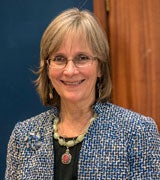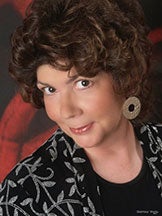
Now a University of Rhode Island professor and assistant dean have created a program that guides eligible students to help them have a more fulfilling experience on campus.
The “Communication Coaching Program” created by Amy L. Weiss, a professor in the Department of Communicative Disorders, and Pamela Rohland, assistant dean of Students, Accessibility and Inclusion, could be used by educators throughout the country.
“We’re excited about offering a program that makes our students’ lives on campus more fulfilling,” says Weiss. “So far, we’re getting positive feedback from the students—and their families.”
 Rohland agrees: “The program is a great example of the University’s commitment to inclusion and diversity. Programs like this can help the URI community increase awareness and decrease fear of the unknown.”
Rohland agrees: “The program is a great example of the University’s commitment to inclusion and diversity. Programs like this can help the URI community increase awareness and decrease fear of the unknown.”
The main goal of the program, Weiss and Rohland say, is to “level the playing field” for students with autism heading off to college. The program helps build the students’ social and academic skills so they can thrive on campus.
There is a wide variation of behavior in autism spectrum disorders. Some people have trouble communicating; others don’t. Some are social; others have problems connecting.
In general, though, people on the spectrum have difficulty picking up on social cues like body language and facial expressions. They might not grasp irony or sarcasm, or understand jokes.
“People with autism might have difficulty understanding someone else’s point of view,” says Weiss. “A person without the disorder knows there are certain things you wouldn’t say out loud that might offend someone. People with the disorder might not have that. They could come across as blunt and possibly hurtful.”
Some people also have trouble staying on task, which can interfere with academic success. A student, for example, might say he or she spent eight hours studying for a test, but actually took only one hour.
Weiss and Rohland launched the program six years ago after recognizing a need to help URI students. They gave training sessions to faculty members and then put together a plan for students.
The “Communication Coaching Program” is unique for many reasons. Graduate students in speech-language pathology provide the instruction, the program is tailored to meet each student’s needs, and the program is a collaboration between student services and academic departments.
From four to six students every semester are enrolled in the program. Students voluntarily sign up, and all information is confidential. The program focuses on five areas: disability counseling; communication coaching; peer coaching; social groups; and campus resources.
All students receive an advisor from Disability Services for Students who meet with them weekly to offer guidance on adjusting to college life. The advisor might help students contact professors about making special accommodations for a test and assist students selecting courses. Advisors also help students manage their time and work on other academic skills.
“These counselors,” says Weiss, “are the students’ lifeline to the University community.”
Communication coaches are graduate students in speech and language pathology in URI’s Department of Communicative Disorders. They help students improve their social skills by talking about experiences they’ve had on campus that might’ve been frustrating and figuring out more socially acceptable ways to deal with them.
Peer coaches are undergraduates close in age to the students. The two might meet at informal places like the Ram’s Den to chat about students’ concerns—or joys.
A social skills group meets weekly on campus to provide additional support to the students and, again, the chance to practice their social skills. The participants are other students in the program.
Students receive additional support from academic advisors; the Academic Enhancement Center; the Writing Center; career exploration departments; the Counseling Center; Health Services; Housing and Residential Life; and enrollment services.
Weiss and Rohland hope other universities use the program, as well as high schools preparing students on the spectrum to transition into higher education. The program should also appeal to parents trying to find a nurturing college for their children.
“Having this program in place is important for parents who have been highly involved in their students’ education,” says Rohland. “It’s comforting for parents to know there’s an extensive support program in place to help their children navigate the college environment.”
Rohland says the future of the program looks bright: “People who have autism spectrum disorder can make really good contributions to society. This program helps people understand that students who have autism are not so different in many ways from other students. In life, we’re more alike than we are different.”
Also involved in the program are Paige Ramsdell, assistant director of Disability Services for Students; Jacqui Tisdale, coordinator of Disability Services for Students; Rosemary Lavigne, coordinator of Disability Services for Students; and Maggie Korn, a graduate assistant at Disability Services for Students who is getting her doctorate in school psychology.
Pictured above: In black shirt, Amy L. Weiss, a professor in the Department of Communicative Disorders. Photo courtesy of URI.
Pamela Rohland, assistant dean of Students, Accessibility and Inclusion. Photo by Michael Salerno Photography.

